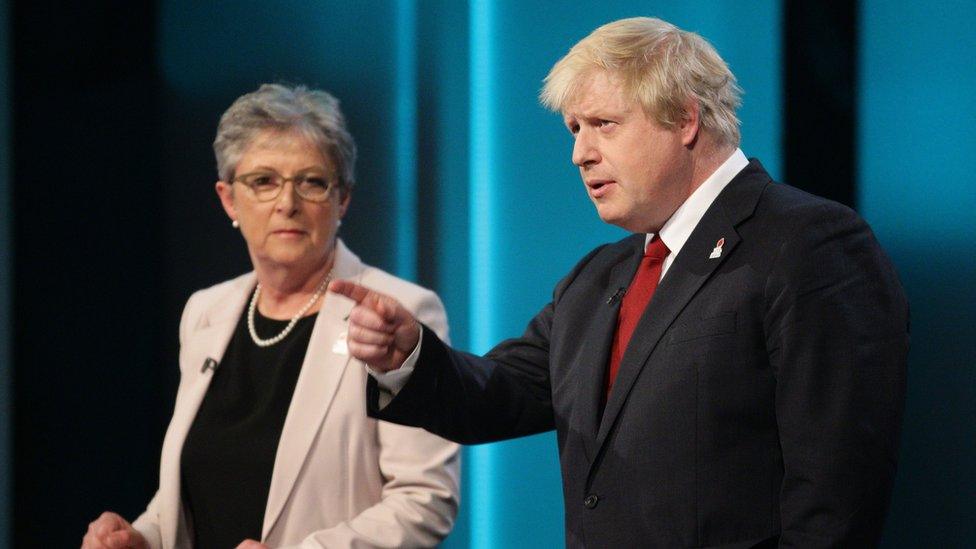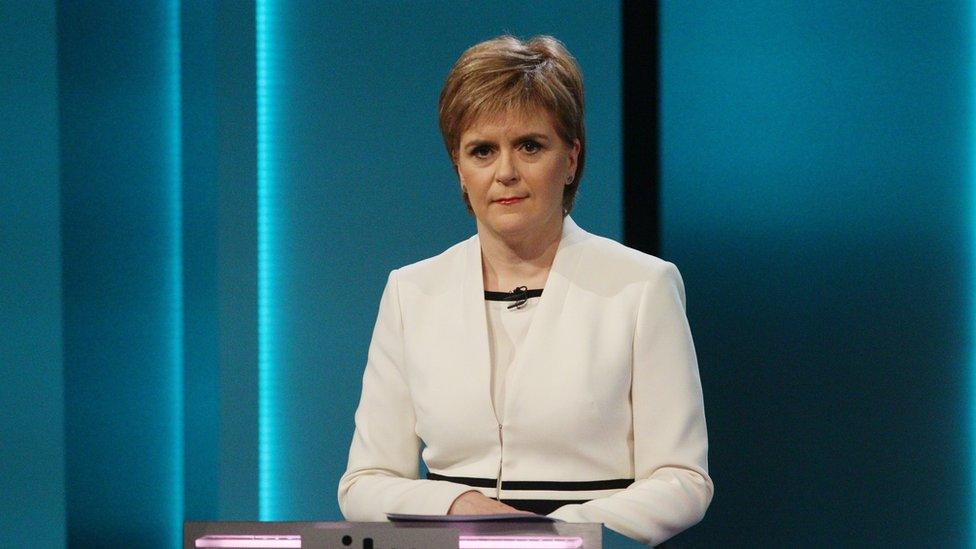EU referendum: Remain target Boris Johnson in TV debate
- Published
Boris Johnson was the "obvious political target for the other side", as Laura Kuenssberg reports
Boris Johnson has said Britain could "prosper as never before" outside the European Union but was accused in an ITV debate of vying to be the next PM.
Nicola Sturgeon said he was "only interested in David Cameron's job" and Conservative Amber Rudd also attacked his reported leadership ambitions.
He said it was easier to concentrate on "personal stuff" and said the Leave side were offering "hope" over fear.
Immigration, the economy and NHS funding dominated the debate.
Mr Johnson drew much of the fire from politicians on the Remain side - Labour's Angela Eagle, Scotland's First Minister Nicola Sturgeon and his own Conservative colleague, Energy Secretary Amber Rudd.
He was repeatedly accused of eyeing David Cameron's job - the prime minister has said he will not seek a third term.
"I think you only care about one job and that's your next one," said Ms Eagle to Mr Johnson.
'Getting personal'
But Mr Johnson said he was backing the campaign to leave the EU because Mr Cameron had not secured changes in his EU renegotiation which would have allowed him to cut net migration below 100,000.
"There has got to be democratic consent for the scale of the flows that we are seeing." he said.
In her closing remarks, Ms Rudd described Mr Johnson as the "life and soul of the party but not the man you want driving you home at the end of the evening".
Mr Johnson responded by describing being in the EU as being locked in the back of a car, headed in the wrong direction "to a destination you wouldn't want to go".

Analysis
By Laura Kuenssberg, BBC political editor
The "outers" were all on the same script.
The "remainers" all had one target - Boris Johnson, who was repeatedly accused, even by his Cabinet colleague Amber Rudd, of being more interested in his own ambition than in the referendum.
The central disputes were all rehearsed - the Out campaign was attacked for not spelling out a precise vision of how the economy would be affected if we leave the EU.
The remain camp was accused of filling voters with fear about what would happen. Migration was a constant theme.
Both sides, inevitably perhaps, claimed victory within minutes.
But while remain clearly tried to diminish the out camp's biggest figure, Boris Johnson, despite two hours of bad tempers, the dynamics of the campaign stay the same.

The former London mayor, alongside Labour's Gisela Stuart and Conservative Andrea Leadsom accused Remain of a "miserable" campaign and getting "personal" while avoiding the key issues.
Mr Johnson, for Leave urged voters to "believe in ourselves" and "take back control" while his Conservative colleague Amber Rudd - making the case to remain in the EU - said that "as a mother", she did not want to take the "risk" of leaving the EU with her children's future.



On immigration - Mrs Leadsom, for Leave, said people were "genuinely struggling with access to public services" and the Remain side had "no answer" to that.
Labour's Angela Eagle, for Remain, said there were no "simple solutions" to the issue but Nicola Sturgeon said "our economy would suffer if we pull up the drawbridge".
The answer to pressure on public services is to invest more in them, she added, blaming government cuts for some of the problems.
And Ms Rudd accused her Conservative colleague Mrs Leadsom of "scaremongering" with her tone over immigration, after she said the UK was "not even in control of our borders".
The debate heated up over the controversial claim by the Leave camp that the UK sends £350m a week to the EU - which critics point out does not include the UK's rebate. Ms Eagle pointed at the Leave campaigners, telling them to "get that lie off your bus" while claiming it was an "absolute whopper".
But Ms Leadsom, for Leave, said when people gave their salaries they did not deduct NI and tax and the rebate and EU subsidies were controlled by the EU: "£10bn a year goes to the EU which we never see again," she said.
The debate, external, moderated by ITV's Julie Etchingham, was held hours before the deadline for registering to vote and two weeks before polling day - 23 June.

What TV debates are left, and when?
BBC:
A live event at Wembley Arena on 21 June with representatives of both sides of the EU debate questioned by voters. David Dimbleby, Mishal Husain and Emily Maitlis to present.
Two special editions of Question Time, moderated by David Dimbleby - with Michael Gove on 15 June in Nottingham and David Cameron on 19 June in Milton Keynes
The Andrew Neil Interviews: Leave or Remain to be broadcast on BBC One on 10 and 17 June with Nigel Farage and Iain Duncan Smith respectively.
Sky
Labour leader Jeremy Corbyn will face questions, external from a studio audience of young people, chaired by Sky's political editor Faisal Islam on 20 June.
Channel 4
Debate on 22 June, the day before the referendum, featuring "politicians, opinion formers and other high-profile pro and anti-protagonists"